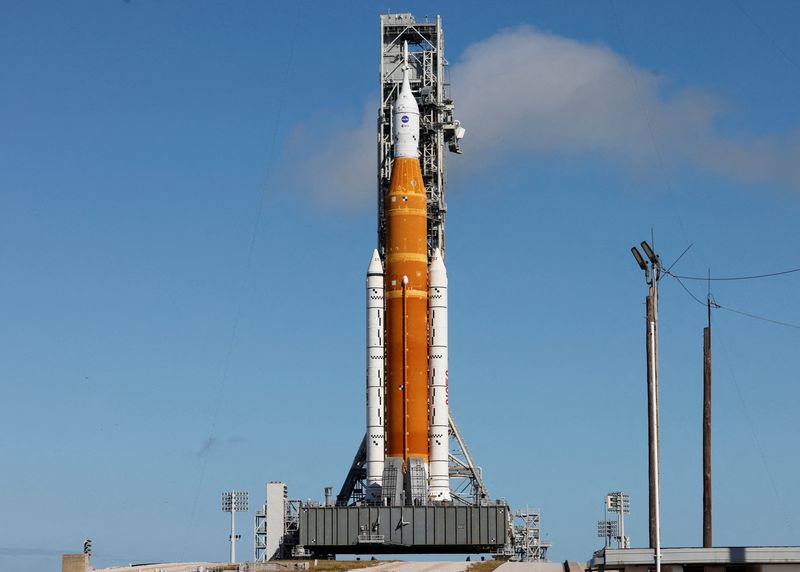By Joey Roulette
WASHINGTON (Reuters) - NASA's plans to turn over its flagship rocket to contractors Boeing (NYSE:BA) and Northrop Grumman (NYSE:NOC) to find more buyers and bring down costs faces steep hurdles thanks to meager demand even from the Pentagon and a sprawling supplier network.
The U.S. space agency is pushing ahead with plans to hand ownership of the Space Launch System (SLS) to a Boeing-Northrup joint venture in the next few years, with a goal of cutting in half the rocket's price tag - estimated at $2 billion. But finding a market for a giant and costly rocket promises to be difficult, with the U.S. Department of Defense (DoD) - seen as a potential customer - signaling little interest.
"It's a capability right now that we, the DoD, don't need," Colonel Douglas Pentecost, a senior rocket acquisition official with the U.S. military's Space Force, said in an interview. "We have the capability that we need at the affordability price that we have, so we're not that interested in some partnership with NASA on the SLS system."
As a commercial venture, the SLS could face other challenges including competition from cheaper and reusable rockets such as Starship from Elon Musk's SpaceX and New Glenn from fellow billionaire Jeff Bezos's Blue Origin. The SLS is not reusable.
The SLS is an impressive sight, resembling an immense dart as it towers as tall as a 32-story building on the launch pad. But it has only ever served NASA. Its first and only use so far was last November when it was successfully launched from Florida as part of NASA's Artemis program that aims to return astronauts to the surface of the moon as early as 2025.
NASA's SLS vision has its skeptics.
"I don't see the cost going down at this point to be competitive, just given the history and how challenging of a rocket it is to build," said Cristina Chaplain, former assistant director of the Government Accountability Office (GAO), the investigative arm of the U.S. Congress.
"Even when they stabilize production, I don't see them having quite the factory line that you need to get for that kind of thing," added Chaplain, who led GAO audits of SLS.
A lack of SLS launch dates amid a backlog of Artemis program missions in the coming years is another roadblock, even if there is demand for the rocket beyond NASA, Chaplain said.
NASA currently manages SLS production, with Boeing and Northrop its top contractors, each having contracts under which the space agency bears any delay costs. Boeing and Northrop executives have declined to discuss plans for cutting SLS costs under the proposed commercial contract. Boeing said the potential deal was still being negotiated with NASA.
'A MAP TO GET HERE'
The aim would be for the two companies to sell the rocket to other customers for the first time, after its decade in development and successful 2022 debut, NASA officials said. That would let NASA free up its budget and staff for other programs under Artemis.
"If they can sell it, they (Boeing and Northrop) get more flow through the factory, that drives down our recurring engineering cost," Jim Free, head of NASA's space exploration wing overseeing the Artemis program, said in an interview. "We've thought of a map to get there, we need them to engage, to agree with that map."
NASA officials said a key part of the plan is finding new customers, which could include the Pentagon or commercial players.
The Space Force's Pentecost said Boeing has been in talks with U.S. defense officials to explore offering SLS in the Pentagon's Phase 3 National Security Space Launch competition - a procurement program expected to buy billions of dollars in launches from multiple companies. While the SLS meets Pentagon requirements, its slow production rate "probably doesn't," Pentecost added.
Boeing has said SLS would work well for that program, but told Reuters that the company is "not actively pursuing" it at this time.
NASA officials have acknowledged that squeezing the roughly $23 billion SLS program, its vast supplier network and a workforce of thousands of agency and contractor employees into a cheaper and privately managed contract will not be easy. Boeing has said the SLS program has created 28,000 jobs.
NASA wants one SLS rocket produced annually for Artemis and plans to buy four SLS launches from Deep Space Transport, the Boeing-Northrup joint venture, after the fifth mission. The deal includes an option to buy five more launches.
Convincing about 400 suppliers across 46 U.S. states, already struggling with rising labor costs, to increase production and staffing would be another issue, according to Amit Kshatriya, the head of NASA's new Moon to Mars office, formed in March to manage the agency's Artemis and SLS strategy.
Even if Boeing and Northrup do not achieve NASA's cost-cutting goals, the agency still plans to pressure them on reducing costs, Kshatriya said.
"We can't just wait and hope that all these answers come as a part of this one procurement," Kshatriya added.
